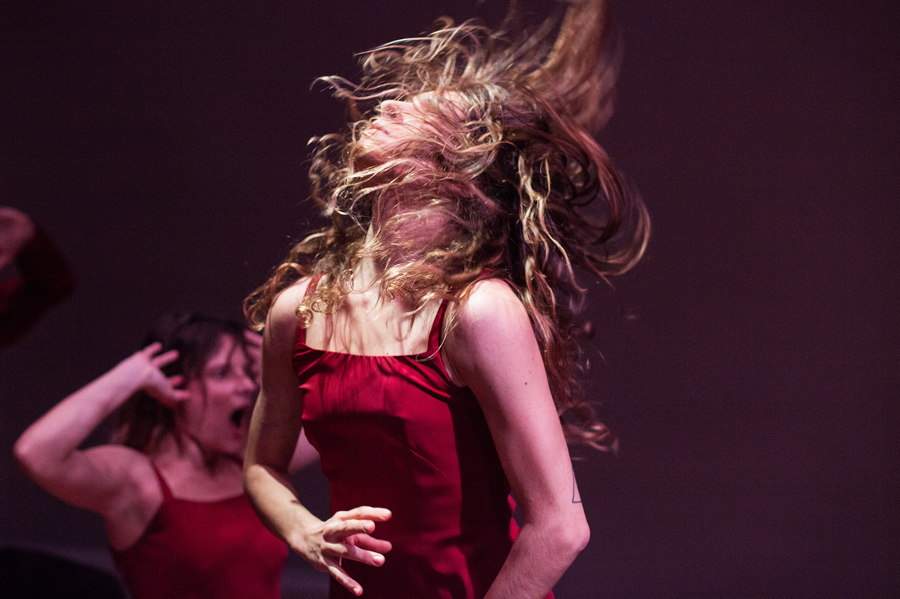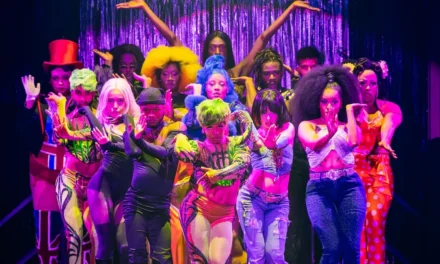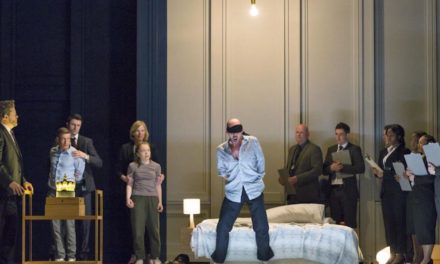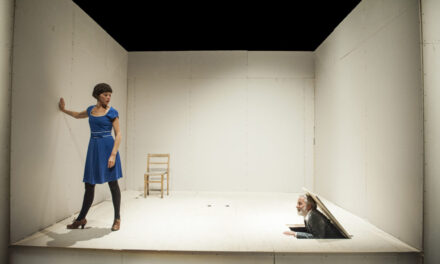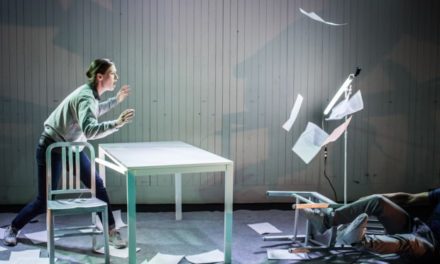No matter how trends, themes, agendas and moods of society change, the focus of the study of art will always be human. After all, it is created by people for people. The message to the man is the core of the current Theatre Olympics, the slogan of which is a line from the large-scale play by Imre Madách, The Tragedy of Man: “O Man, strive on, strive on, have faith; and trust!” This keen interest in man is reflected in the rich (750 performances) program of the festival that embraced and inspired the whole of Hungary, where the fresh smell of spring is mixed with the intoxicating aroma of theatre. But the peculiarity of the Theatre Olympics is that its purpose is not to entertain or distract the audience from heavy thoughts, but rather to concentrate its attention on the actual and timeless foundations of life, problems and challenges, moral, philosophical and seemingly abstract categories, which, however, have a concrete impact on our lives. If we do not reflect on these or those aspects of our existence, they will overtake us, and the retribution for this unwillingness to stop to think in the hustle and bustle of the age will be great. This is what we see today as we look at a world devoid of peace.
Sometimes it seems that we have reached a stage of development where literature of the absurd or surrealism no longer surprises nor strikes the imagination with its detachment from life, but is perceived as part of the general world landscape. Today, having lived through the experience of prolonged world suffering, we are willing to believe in the most unrealistic things. We have become convinced that what we thought could not be is embodied in reality. This is why the productions of Greek director Savvas Stroumpos seem to be deliberately detached from specific geography and chronology, and perhaps this is why they are so precisely in the present day.
As part of the Theatre Olympics, the director is presenting his production, Report to an Academy, created at Zero Point Theatre, of which he is the chief director. The stage action is based on Franz Kafka’s short story of the same name. But just as in a few pages of Kafka’s story we can describe the life of a man and the world, so in this one-act production, which lasts seventy minutes, we have managed to reflect the most painful aspects of our days: the dehumanization of mankind.
According to the plot the main character is Rotpeter (literally Red Peter, that’s the main color of the play – red. It is not literalism, but the color of a bleeding epoch) reads a report at a scientific conference. He tells of his personal experience of transformation and transfiguration from monkey to man. But there is no triumph of evolution here and no hymn to the fact that a less evolved being has been transformed into a being of a higher order. On the contrary, progress here is tantamount to degradation. From herd mentality to a sense of one’s own identity, the hero travels the path and in the finale he finds himself once again in the “herd of people,” merging with the crowd. This is not a path of gain, but of endless loss. You don’t need humanity to become human, you only need to copy the rituals of the human community. The monologue, divided into voices and vocal and bodily scores in the play acquires the feeling and frankness of a post-traumatic confession. The fragility of soul and body here is supported by the jaggedness of the movements of human bodies.
No longer a monkey, but no longer a human being tells of being shot and captured by hunters, castrated and loaded onto a ship. Sitting in a cage, deprived of his freedom, he reflects on it. What we have we do not value, and only when we lose it do we realize the loss. Freedom here is realized not so much by the mind as by the body. The body resists imprisonment. The hero understands that the thirst to get out of the confined space is not yet the will to freedom. The hero honestly admits that he has never thought about freedom in a large-scale sense, limited by the scale of the cage. Could it be that the inability to appreciate freedom means that we are not worthy of it? How do external and internal freedom relate? And is it possible to lose one and keep the other? The play and the plastic bodies, which at times resemble question marks, in the rhythmic narration leave the viewer alone with a heap of various questions – all of which are difficult to solve. Be that as it may, the play about freedom demonstrates the infinity of freedom of theatrical gesture and theatrical breathing with the whole chest.
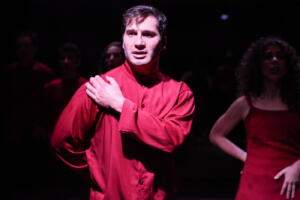
PC: Antonia Kanta.
This is not the first time that Savvas Stroumpos has turned to the work of Kafka. He has already staged In the Penal Colony (2009 and 2014) and Metamorphosis (2012), as well as a production based on Gyorgy Kurtag Kafka, Fragments (2018). In the current production, the director dissects Kafka’s text, turning it into performance art. Theodoros Terzopoulos’ intense collaboration with Savvas Stroumpos was the basis for his method of work based on comprehension of acting psychophysics. At the center of the artistic practices and experiments of the director is the body as the basis of artistry. His plastics, vocal apparatus, corporeality as a means of self-expression. It is curious how in the performance the category of “speech” emerges from bodily practices, how the hero either gains or loses the word. Words and sound imitation here fill the air with a dark energy. This is not a comedic Bingo Bongo with Adriano Celentano, this is a psychiatric séance multiplied by a confession in the temple of Dionysus.
The protagonist realizes that the only way to survive is to adapt. He begins to imitate the people around him. Penetrating this Greek setting one realizes the category of mimesis (μίμησις) imitation in its entirety. From ritual imitation to creative reproduction (according to Aristotle). But can one become human by imitation? And are those whom the hero imitates human beings? Have they not, unexpectedly, become degenerated into “social monkeys” beings? And won’t man break his essence under the whip of social training? Curiously, the main acts of initiation are drinking alcohol, smoking, and the ability to spit.
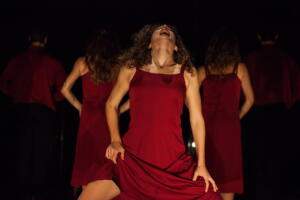
PC: Antonia Kanta.
Metamorphosis is also about transformation. Gregor Samsa suddenly transforms from human into insect, while in “Report to an Academy” the transformation is reversed: from animal into human. Despite the character’s words that the change in him is unconscious and instinctive, this painting is not about Darwinism and evolution. There is no social satire, through the lens through which Kafka’s work is often interpreted. Nor is there a theme of Jewish assimilation, to which Kafka’s message is often trying to be reduced to, given that the story was first published by Martin Buber in Der Jude. Savvas Stroumpos does not tie his story to specific circumstances and particulars. He concentrates not on plot details, but on the categories surrounding and clutching the man.
In the story, Rotpeter was faced with a choice: the zoo or the variety show. Without thinking twice, he chose the creative path, not wanting to drive himself into a cage. Unleashing, releasing, overcoming fetters and barriers is the motivation of the protagonist and the participants of the performance. Through the efforts of the seven performers the story of transformation into a human being and at the same time of the disappearance of humanity in man is also transformed into a story of the birth and the powerful power of theatrical energy. Savvas Stroumpos creates an extremely energetic and energetic canvas in which words are rhythmically supported by stage movement and gestures. Here the body is liberated and followed by a beastly cry of suffering, as if from the depths of the soul. Suffering as an experience here transforms the monkey into a man and the man into an actor. “The human, who was an ape, becomes an actor to be able to express his trauma, to never cease talking about it. This exposition of the trauma in theatrical and musical terms is a temporary redemption. The humor of this creature is always mournful and self-sarcastic because it is born out of the wound,” says Savvas Stroumpos about his idea.
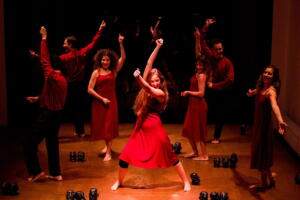
PC: Antonia Kanta.
Report to an Academy is also a conversation about the loss of identity and memory. Rotpeter honestly admits that he has forgotten how he was a monkey. He has broken away from his roots. He turned out to be a man without a past. Or did he wish to forget and give up his “monkey past” in order to become human? But is it possible for a man without history behind him, without the burden and responsibility of memory, without the memories of personal and collective memory? It follows from the play that consciousness, memory and mind can deceive, and the body, even mutilated, does not lose its fidelity and does not betray the soul nestled in it. The performance of Savvas Stroumpos is like a collective ritual – a plea for the awakening of the human in man, like a plea for rain.
The human and the human are not substitutes for, but sometimes refute each other in this story about being or not being human, and how to be human. In the finale of Kafka’s story, Rotpeter behaves like a lecturer at a TED conference, sharing his success story, a self-made man story, but the audience, like the readers, feel a sense of bitter disappointment not at the impression of the hero, but of modern man, not much different, at times, from a trained monkey. Where another director would have produced a superficial pamphlet, Savvas Stroumpos succeeds in creating a pulsating, disturbing, energetic theatrical performance. With his psychophysically expressive theatrical and ritualistic action, the director stirs the thoughts and human sense of self in the audience, who suddenly become aware of themselves as participants in this ritual.
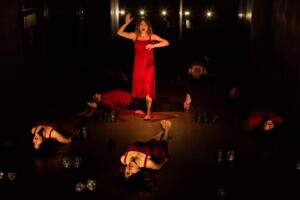
PC: Antonia Kanta.
The Theatre Olympics and the MITEM festival within it set a rather high thematic and artistic bar right from the start. Despite the impressive statistics, what matters here is not the quantity, but the quality – of the performances, of the events surrounding them, of the spectator experience. It seems that the organizers set the goal to collect the plays without ordinary productions that would leave the public indifferent and apathetic. Here one wants to argue, to communicate with the creators, to question oneself and others. And this space for free dialogue promises to be an integral part of the Theatre Olympics, sincerely believing in man and inspiring people not to lose faith in themselves, in the world and in the higher forces. And even in a play about a monkey, there is no monkeying around.
Read about the vibrant new productions of the Theatre Olympics in The Theatre Times, and if you haven’t had the pleasant surprise of going to the theatre for a long time, it is worth going to Hungary for it. The Theatre Olympics are just getting started!
This post was written by the author in their personal capacity.The opinions expressed in this article are the author’s own and do not reflect the view of The Theatre Times, their staff or collaborators.
This post was written by Emiliia Dementsova.
The views expressed here belong to the author and do not necessarily reflect our views and opinions.

